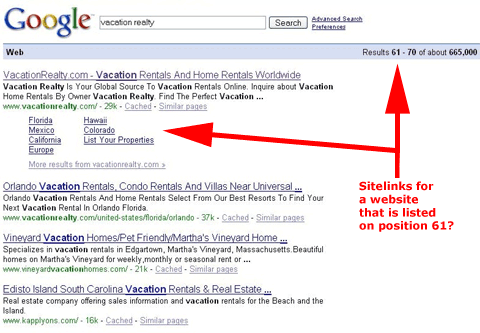Googles -60 penalty and how to avoid it
by Admin
16 May
Copyright by Axandra.com
Copyright by Axandra.com
Web site promotion software
During the last weeks, people in online forums observed some strange Google result changes. Rumor has it that there is a new -60 penalty that Google applies to websites in which it has lost trust.
Web site promotion software
During the last weeks, people in online forums observed some strange Google result changes. Rumor has it that there is a new -60 penalty that Google applies to websites in which it has lost trust.
What has happened?
Some webmasters found websites that were listed on position 61 in Google's search results that had Google Sitelinks below their listing.

Normally, Google only displays Google Sitelinks for the first search result.
Many webmasters believe that the website that was listed on position 61 with the Sitelinks was the number 1 result for that keyword but had been penalized by Google.
What does Google say about the -60 penalty?
In a Google Groups discussion about showing Sitelinks for #61 results Google employee John Mu referred to a -60 penalty discussion.
Google hasn't officially confirmed that a -60 penalty exists. However, Google employee John Mu indicated in a discussion about the -60 penalty in the official Google groups that Google penalizes websites if they contain certain spam elements.
Which spam elements trigger the -60 penalty?
It looks that Google applies this penalty to websites that buy links.
Many of the websites that seem to have been penalized had many inbound links from websites that linked to them from every single page of their website (so-called site-wide links). Sitewide links are an indicator of paid links, which Google sees as an unwanted way to artificially inflate search engine rankings.
The head of Google's anti-spam team Matt Cutts has often said that websites that buy paid links will be penalized and it looks as if Google tries to do the job properly.
If this penalty for paid links really exists then even websites that follow Google's rules can get in trouble. Your competitors could harm your website simply by buying links or by creating mini-net websites with sitewide links to your website.
Instead of penalizing seemingly "bad" links, Google should simply ignore them. That way, people could not harm competitor websites. If you don't want to get in trouble with Google, you should only use ethical search engine optimization methods.
Copyright by Axandra.com
Web site promotion software
Some webmasters found websites that were listed on position 61 in Google's search results that had Google Sitelinks below their listing.

Normally, Google only displays Google Sitelinks for the first search result.
Many webmasters believe that the website that was listed on position 61 with the Sitelinks was the number 1 result for that keyword but had been penalized by Google.
What does Google say about the -60 penalty?
In a Google Groups discussion about showing Sitelinks for #61 results Google employee John Mu referred to a -60 penalty discussion.
Google hasn't officially confirmed that a -60 penalty exists. However, Google employee John Mu indicated in a discussion about the -60 penalty in the official Google groups that Google penalizes websites if they contain certain spam elements.
Which spam elements trigger the -60 penalty?
It looks that Google applies this penalty to websites that buy links.
Many of the websites that seem to have been penalized had many inbound links from websites that linked to them from every single page of their website (so-called site-wide links). Sitewide links are an indicator of paid links, which Google sees as an unwanted way to artificially inflate search engine rankings.
The head of Google's anti-spam team Matt Cutts has often said that websites that buy paid links will be penalized and it looks as if Google tries to do the job properly.
If this penalty for paid links really exists then even websites that follow Google's rules can get in trouble. Your competitors could harm your website simply by buying links or by creating mini-net websites with sitewide links to your website.
Instead of penalizing seemingly "bad" links, Google should simply ignore them. That way, people could not harm competitor websites. If you don't want to get in trouble with Google, you should only use ethical search engine optimization methods.
Copyright by Axandra.com
Web site promotion software
News Categories
|
|
|